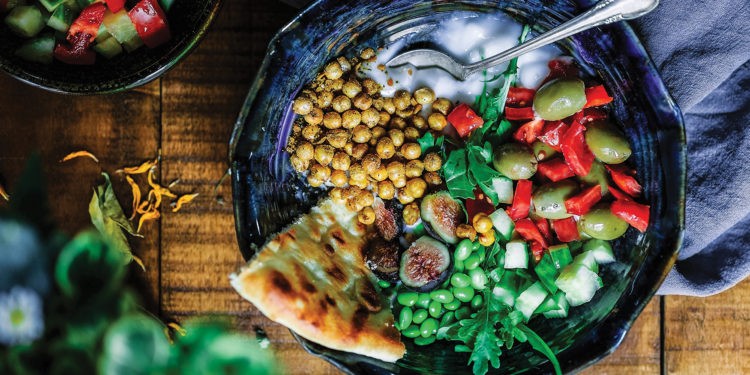May Is Perfect Month to Begin the Mediterranean Diet

More than just a diet, the Mediterranean plan of eating is a lifestyle, involving social, mental and mood-boosting benefits.
Although the month of May is typically touted as Mediterranean Diet Month, it is a fun and savory lifestyle you can enjoy all year round. The mouth-watering flavors, accessibility and affordability of the foods that comprise this phenomenal way of eating are something worth holding onto every day of the year.
The Mediterranean Diet, a plan reflective of the various eating traditions of countries that surround the Mediterranean Sea, has been a popular eating lifestyle plan for many years. When it comes to food from this region, one’s thoughts might turn to lamb chops, long loaves of white bread, three-hour festive meals and copious bottles of wine. As enticing as that might sound, the true Mediterranean Diet has its roots in the traditional fruits, vegetables, beans, nuts, seafood, olive oil and dairy that are indigenous to the region. (Okay, there may be a glass or two of red wine involved, so our thoughts aren’t completely off-base!) Around the 1960s, the residents of Crete, Greece and southern Italy enjoyed a diet rich in these staples and interestingly enough, their rates of chronic disease and illness sat among the lowest in the world. At the same time, their life expectancy stood among the highest, despite having limited medical resources.
While it is true the Mediterranean Diet consists of consuming fresh, wholesome foods, it also requires the commitment to daily physical activity and sharing meals with others, all of which are essential elements of the Mediterranean Diet Pyramid. Woven together, these elements can produce a positive effect on one’s mood and overall mental and emotional well-being, as well as contributing to a lifelong love of eating healthy and delicious foods.
What exactly is in the traditional Mediterranean Diet?
The diet typically consists of copious amounts of fresh fruits, vegetables, nuts, fish and olive oil. Pair these tasty ingredients with some regular physical activity and you can potentially reduce your risk of serious mental and physical health problems such as heart disease and strokes. When following the Mediterranean Diet, be prepared to limit your consumption of processed foods, red meat, and refined breads. However, if red wine or some hard liquor tempts your palate, then you are in for a treat. (Fair warning: this is by no means a suggestion for over-indulgence in alcohol. Please exercise moderation.)
An added benefit of all of the great food on this plan is continued agility. If you are an older adult, the nutrients in the Mediterranean Diet may reduce your risk of developing muscle weakness or other indications of frailty. It can also reduce the risk of Alzheimer’s, as the diet can improve cholesterol and blood sugar levels, as well as overall blood vessel health. The fiber in this diet can protect against type 2 diabetes and the high level of antioxidants can prevent cells from being damaged by oxidative stress, which in turn can reduce the risk of Parkinson’s disease. And, by reducing your risk of debilitating diseases, the diet opens the door to longevity.
Despite all of the benefits of this plan, there are a few misconceptions surrounding the diet.
While it may sound expensive to commit to this plan, it is less expensive than serving dishes of packaged or processed foods. By creating meals from beans or lentils as the main source of protein and coupling that with mostly plants and whole grains, you can by-pass the higher costs associated with the processed foods.
With the inclusion of wine in the diet – as it has been linked to healthy heart benefits – one might erroneously assume if one glass is good, then three glasses are better. There is distinct line between moderation and over-indulgence. Drinking too much can be harmful to your health. Therefore, proponents of this diet suggest one drink a day for women and two for men.
Another misconception about this diet revolves around the idea that Mediterranean people consume large amounts of pasta and bread. Unlike many Americans, the people of the Mediterranean region serve pasta as a small side dish, around one-half cup to one cup as a full serving. The rest of their plate is focused on salads, vegetables, fish or perhaps a small piece of organic, grass-fed meat and maybe one thin slice of bread. Again, moderation is a key component in this diet.
This diet is not just about the food, either. It is about sharing time with others and actually sitting down for a meal without rushing through it. There is no television involved; no cell phones; and no other distractions except for the company of others, leisurely enjoying a meal with heaping helpings of laughter and fun served in large quantities.
Ready to get started?
If you want to get started on this diet, it is not as overwhelming as you might think. You can ease into it with baby steps. Start with a small plate of sliced tomatoes drizzled with olive oil and some crumbled feta cheese. Consider a thin crust pizza topped with peppers and mushrooms instead of sausage and pepperoni. Start your day with a Mediterranean-style breakfast, which includes fruit, whole grains and fiber-rich foods which will keep you full and satisfied for hours.
Incorporate some seafood into your diet twice a week. Aim for the omega-3 fatty acids which are found in tuna, salmon, herring, and sardines. If you prefer shellfish, opt for oysters, clams and mussels, all of which can boost your brain and heart health. Stick to the good fats, as well, such as those found in extra-virgin olive oil, nuts, sunflower seeds, olives and avocados.
Devote one night each week to a meatless meal. Pick a day where you focus on building a dinner from beans, whole grains and vegetables. After a while, you can expand this to two days a week and then build from there.
Dairy products are not out of the picture entirely but in moderation. Think: unprocessed cheese, plain or Greek yogurt. And dessert is still on the table in the form of fresh fruit such as strawberries, figs, grapes or apples.
Be sure to make this a family affair, too, and gather everyone around the dinner table, making it a priority to enjoy the meal and one another’s company. You will soon realize the benefits of eating at a relaxed pace. If you live alone, make a bit more and invite a friend or a neighbor to join you. The Mediterranean Diet is all about the relationship you develop with the food you eat as well as the relationships you’ve strengthen with others.
Sources: helpguide.org, womenfitness.net






